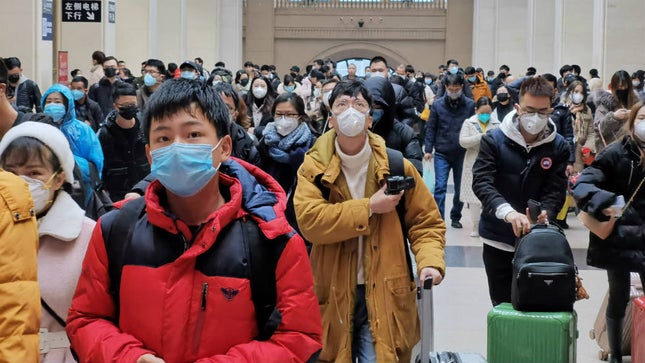Over the past two months, reports of COVID-19, or coronavirus, cases have spiked across the globe. Most of these cases have been in China, however that has not stopped the World Health Organization (WHO) from declaring a global health emergency due to its rapid advancement into countries around the world. China’s authoritarian government’s negligence has accentuated COVID-19’s spread. The state’s survival depends on a strict control of information and, in the case of COVID-19, the government’s choices to suppress information regarding the virus has delegitimized Xi Jinping’s rule.
The name COVID-19 comes from “coronavirus,” a family of viruses that are present in a variety of animals. Very few coronaviruses can spread from animals to people such as the Middle East respiratory syndrome (MERS) and severe acute respiratory syndrome (SARS) and, now, COVID-19. While much is still unknown about the virus, the Center for Disease Control and Prevention (CDC) explains that COVID-19 spreads between people from close contact via droplets produced when an infected person coughs or sneezes. In the last week (February 9- February 14), the number of cases have surged passed 63,000, with an additional 5,000 cases reported just on Friday (Mahtani 2020).
The Chinese government should be considered an authoritarian one-party system as it is completely run by the Communist Party of China (CPC). In order to maintain authority, the CPC has to convince the Chinese people that everything is going to plan. Under Xi Jinping’s rule, the General Secretary of the Communist Party of China, the party has taken a strong stance on controlling information and restricting press freedoms. This has significantly hindered their response to the severe health epidemic. While the first case of COVID-19 was reported on December 8, the Chinese government took more than 3 weeks to report it (Wasserstrom 2020). Transparency is essential when it comes to public health, however, Chinese doctors who reported the reality of the situation were arrested for “spreading rumors” (Wasserstrom 2020). More than anything, a public health emergency requires trust and the government’s response in the first few weeks of the outbreak has raised some questions.
The case of COVID-19 has shed some light on issues with China’s top-down control. First, nobody acted until they were told to. This was evident in the city of Wuhan where the outbreak began when the initial reaction was for local government officials to cover it up. Not until they were told to act on it did anything happen – likely in reaction to pressure from foreign countries. Second, once actions are finally taken, everyone “wildly overreacts” (The Coronavirus Outbreak Could Derail Xi Jinping’s Dreams of a Chinese Century n.d.). Jude Blanchette, a China analyst at the Washington-based Center for Strategic and International Studies, explains how “[t]he full CCP apparatus didn’t kick into gear to address the coronavirus until Xi had weighed in on the matter” (The Coronavirus Outbreak Could Derail Xi Jinping’s Dreams of a Chinese Century n.d.). Now, China has taken unprecedented public health measures this week trying to quarantine entire cities in Hubei. About 60 million people are under various travel restrictions, as roads are blocked, train stations closed and flights canceled, and various cities are on complete lockdown (CNN n.d.).
However, in the past week, the Chinese government has finally started changing their narrative, becoming more transparent and collaborative with outside help in taking on COVID-19. On Tuesday, February 11, the Chinese government fired two senior health officials in Hubei province, the epicenter of the coronavirus epidemic, placing Beijing in direct control of efforts there to contain its spread. It appears as this change in power and acceptance of help was in response to the report of 108 new deaths from the virus which amounts to 10% of the total reported deaths (Beijing Takes Direct Control Over Coronavirus Response In Hubei Province n.d.).
While much of the information we currently have regarding COVID-19 remains shrouded in uncertainty, the crisis has already demonstrated the consequences China’s centralization of power can cause. Despite the recent steps the government has taken to stop the spread of the virus, fear and rage begin to spread throughout China and people are beginning to speak out against Xi and his government. For some, the “national calamity” can only be attributed to the “systemic impotence” that Xi has created (Kuo 2020). It is clear that the government’s actions towards the virus has left it’s country in a brittle state (Kuo 2020). Now, the only question is if and when it will snap.
Works Cited
“Beijing Takes Direct Control Over Coronavirus Response In Hubei Province.” NPR.org. https://www.npr.org/sections/goatsandsoda/2020/02/11/804737888/beijing-takes-direct-control-over-coronavirus-response-in-hubei-province (February 14, 2020).
CNN, Lily Lee and Joshua Berlinger. “China Has Deadliest Day for Coronavirus, US National Becomes First Foreigner to Die.” CNN. https://www.cnn.com/2020/02/08/asia/coronavirus-deaths-china-intl-hnk/index.html (February 14, 2020).
Kuo, Lily. 2020. “Coronavirus: Outspoken Academic Blames Xi Jinping for ‘catastrophe’ Sweeping China.” The Guardian. https://www.theguardian.com/world/2020/feb/11/coronavirus-outspoken-academic-blames-xi-jinping-for-catastrophe-sweeping-china (February 14, 2020).
Mahtani, Shibani et al. “Live Updates: Coronavirus Cases Surge Again in China; More than 1,700 Medical Workers Infected.” Washington Post. https://www.washingtonpost.com/world/asia_pacific/coronavirus-china-live-updates/2020/02/14/6806aa08-4eb8-11ea-b721-9f4cdc90bc1c_story.html (February 14, 2020).
“Statement on the Second Meeting of the International Health Regulations (2005) Emergency Committee Regarding the Outbreak of Novel Coronavirus (2019-NCoV).” https://www.who.int/news-room/detail/30-01-2020-statement-on-the-second-meeting-of-the-international-health-regulations-(2005)-emergency-committee-regarding-the-outbreak-of-novel-coronavirus-(2019-ncov) (February 14, 2020).
“The Coronavirus Outbreak Could Derail Xi Jinping’s Dreams of a Chinese Century.” Time. https://time.com/5778994/coronavirus-china-country-future/ (February 14, 2020).
Wasserstrom, Jeffrey. 2020. “China’s Response to Coronavirus Exposes a Dangerous Obsession with Secrecy | Jeffrey Wasserstrom.” The Guardian. https://www.theguardian.com/commentisfree/2020/feb/05/china-response-coronavirus-obsession-secrecy (February 14, 2020).

